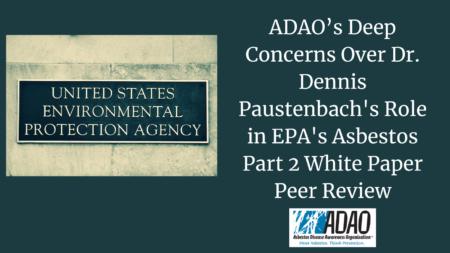Posted on November 1, 2023

On October 25, the Environmental Protection Agency (EPA) published the list of seven scientific experts selected to review the “2023 White Paper on the Quantitative Human Health Approach to be Applied in the Risk Evaluation for Asbestos Part 2” under the Toxic Substances Control Act (TSCA).
The seven selected reviewers are:
- Henry A. Anderson, MD
- Robert S. Herrick, ScD, MS, CIH
- Michael A. Jayjock, PhD
- Marty S. Kanarek, PhD
- Dennis J. Paustenbach, PhD, DABT
- David C. Roskelley, MSPH, CIH, CSP, FAIHA
- Emanuela Taioli, MD, PhD
The selection of Dr. Dennis Paustenbach as a peer reviewer for EPA’s important Part 2 risk evaluation has raised concerns within the Asbestos Disease Awareness Organization (ADAO).
In our September 27 letter titled, “Opposition to the Nomination of Dr. Dennis Paustenbach as a Peer Reviewer for the 2023 White Paper on Asbestos Risk Evaluation”, ADAO expressed deep concerns about Dr. Paustenbach’s nomination as a peer reviewer, citing significant conflicts of interest that in our opinion, render him unsuitable for this critical peer review process.
The peer review process holds a pivotal role in assessing the scientific basis for the EPA’s Risk Evaluation for Asbestos Part 2: Supplemental Evaluation Including Legacy Uses and Associated Disposals of Asbestos white paper. Asbestos is a human carcinogen and there is no safe level of asbestos exposure.
Peer reviewers bear the responsibility of providing disinterested scientific advice that assists in protecting Americans from the perils posed by asbestos. Dr. Paustenbach’s selection as a peer reviewer, given his extensive ties to the industry and the questionable scientific positions he has taken on behalf of companies with financial interests in the outcome of EPA’s work, raises doubts about the EPA’s ability to conduct an impartial and scientifically rigorous evaluation. His affiliations with Exponent, ChemRisk, and Cardno-ChemRisk call into question his capacity to support objective science that ist in the best interests of the American public on the Part II panel for this crucial review.
ADAO staunchly upholds the principle that peer reviewers must remain free from conflicts of interest to ensure the integrity and credibility of the peer review process, directly impacting the safety of the American people.
In conclusion, the integrity of the peer review process assumes paramount importance when assessing the risks linked to asbestos exposure. ADAO remains steadfast in its commitment to advocating for impartial and transparent assessments that prioritize the well-being of the American public. We earnestly urge the EPA to reconsider Dr. Paustenbach’s appointment and select a replacement who can fulfill this role without conflicts of interest.
Linda Reinstein
